

Formally defined, psychology can be called the scientific study of behaviour and mental processes.
Parenting styles: An evidence-based guide. Parenting styles: An evidence-based guide © 2010-2018 Gwen Dewar, Ph.D., all rights reserved The concept of parenting styles was first introduced by Diane Baumrind to explain differences in the way parents attempt to control and socialize their children.
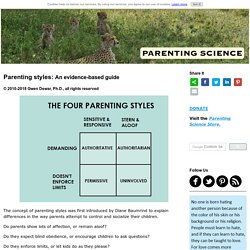
Do parents show lots of affection, or remain aloof? Do they expect blind obedience, or encourage children to ask questions? Do they enforce limits, or let kids do as they please? Family Transitions - Google Books. Parenting Style as Context: An Integrative Model. 4 Types of Parenting Styles and Their Effects on Kids. Your parenting style can affect everything from how much your child weighs to how she feels about herself. 4 Parenting Styles - Characteristics And Effects [Infographic] - ParentingForBrain.
Parenting Styles: A Closer Look at a Well-Known Concept. What Is Authoritative Parenting? Authoritative parenting is characterized by reasonable demands and high responsiveness.
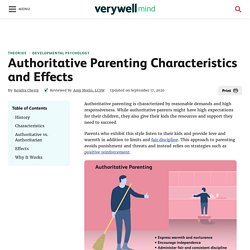
While authoritative parents might have high expectations for their children, they also give their kids the resources and support they need to succeed. The authoritative parenting style: An evidence-based guide. © 2010 - 2017 Gwen Dewar, Ph.D., all rights reserved What is authoritative parenting?

The authoritative parenting style is an approach to child-rearing that combines warmth, sensitivity, and the setting of limits. Parents use positive reinforcement and reasoning to guide children. They avoid resorting to threats or punishments. This approach is common in educated, middle class families, and linked with superior child outcomes throughout the world. Kids raised by authoritative parents are more likely to become independent, self-reliant, socially accepted, academically successful, and well-behaved.
They are less likely to report depression and anxiety, and less likely to engage in antisocial behavior like delinquency and drug use. Research suggests that having at least one authoritative parent can make a big difference (Fletcher et al 1999). Authoritative Parenting Style. By Stephen Walton © 2012 What's It All About?...
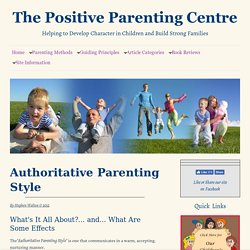
And... What Are Some Effects The"Authoritative Parenting Style" is one that communicates in a warm, accepting, nurturing manner. Parents maintain firm expectations and restrictions on their children's behaviour while holding them accountable for their own actions. With love, understanding and respect for their children, they provide the important structure needed in the family environment.
Developmental psychologist Diana Baumrind in her comprehensive studies based on the dimensions of "Parental Responsiveness" and "Parental Demandingness" conclude that: Characteristics and Effects of Uninvolved Parenting. Uninvolved parenting, sometimes referred to as neglectful parenting, is a style characterized by a lack of responsiveness to a child's needs.
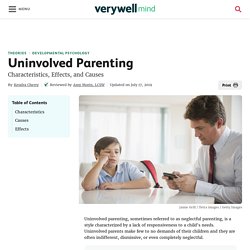
Uninvolved parents make few to no demands of their children and they are often indifferent, dismissive, or even completely neglectful. Uninvolved Parenting Style. By Stephen Walton © 2012 The Uninvolved Parenting style (often referred to as neglectful parenting) as the name implies, the parent is totally disengaged and emotionally uninvolved in their child's life. There is little if any expression of love and affection.
Developmental psychologist Diana Baumrind in her studies based on the dimensions of "Parental Responsiveness" and "Parental Demandingness" conclude that: What Is Permissive Parenting? Permissive parenting is a type of parenting style characterized by low demands with high responsiveness.
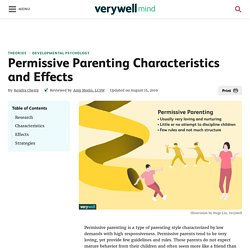
Permissive parents tend to be very loving, yet provide few guidelines and rules. These parents do not expect mature behavior from their children and often seem more like a friend than a parental figure. These parents tend to be the polar opposite of the so-called "helicopter parents. " Instead of hovering over their children's every move, permissive parents are incredibly lax and rarely make or enforce any type of rules or structure. Their motto is often simply that "kids will be kids. " Because there are few rules, expectations, and demands, children raised by permissive parents tend to struggle with self-regulation and self-control.
Permissive Parenting Style. By Stephen Walton © 2012 What's It All About... and...
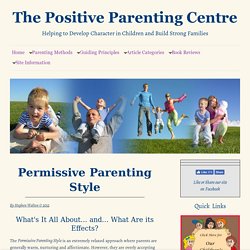
What Are its Effects? The Permissive Parenting Style is an extremely relaxed approach where parents are generally warm, nurturing and affectionate. However, they are overly accepting of their children's behaviour, good or bad. The Definition of Authoritarian Parenting. Authoritarian parenting is a parenting style characterized by high demands and low responsiveness.
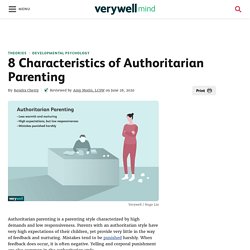
Parents with an authoritarian style have very high expectations of their children, yet provide very little in the way of feedback and nurturing. Mistakes tend to be punished harshly. When feedback does occur, it is often negative. Yelling and corporal punishment are also common in the authoritarian style.
During the 1960s, developmental psychologist Diana Baumrind described three different types of parenting styles based on her research with preschool-age children. Authoritarian parenting: What happens to the kids? Photo by CEphoto, Uwe Aranas © 2010-2017 Gwen Dewar, Ph.D., all rights reserved The authoritarian parenting style is about being strict and stern.

It insists on unquestioning obedience, and enforces good behavior through threats, shaming, and other punishments. As defined by psychologists, it's also a style associated with less parental warmth and responsiveness (Baumrind 1991). That doesn't bode well for a child's health outcomes, especially if she's growing up in an otherwise stressful environment. But what about other things -- like behavior problems? Authoritarian Parenting Style And Its Effects. By Stephen Walton © 2012 What's It All About?...
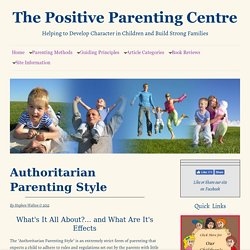
What Is My Parenting Style? Four Types of Parenting. One of the interesting things about being a parent is that there is great variation in how we raise our children. At the same time, there are many commonalities from one parent to another. In fact, there is enough similarity that researchers have tried to group parents into four common parenting styles. Your parenting style refers to the combination of strategies that you use to raise your children. Parental Identity and Its Relation to Parenting and Psychological Functioning in Middle Age: Parenting: Vol 16, No 2. Starting in adolescence, a gradual change takes place from being a recipient of care to being a provider. Such development requires a change in the view of oneself in the world (Erikson, 1959 Erikson, E. H. (1959). Identity and the life cycle. (Psychological Issues Monograph No. 1). Comparison of Personality among Mothers with Different Parenting Styles.
When Parents Clash: Managing Differences in Parenting Style. Many aspects of a person’s life can influence their parenting style. The way an adult was parented, as well as parenting books and other guides, are a few factors. A parent’s unique fears and hopes for their child are another major influence. Cultural factors, such as gender roles, the community in which the family lives, religion, politics, socioeconomic status, and ethnic norms also play a role. How to Cope With Parenting Differences. With the demise of "Brangelina" being attributed, at least in part, to disagreements about parenting, you may be wondering if your own marriage or relationship is at risk. Why Parenting Styles Matter When Raising Children. Developmental psychologists have long been interested in how parents affect child development. Parenting Styles and Child Behavior — Psychology In Action.
More extensive research is critical to enhancing the field’s current understanding of parenting styles and the role they play in child behavioral outcomes. An increased understanding of the roots of different parenting practices, may enable the field to more effectively address the environmental factors that lead parents to adopt less ideal strategies. This research should be used to guide the development of more effective prevention and intervention programs aimed at fostering adaptive behavioral development in children. Because parenting programs have been found to demonstrate a large and sustained effect on early disruptive behavior problems (Comer et al., 2013), it is important to ensure these programs are widely available to at-risk families, and that these families are aware of their availability. The effects of parenting styles on behavioral problems in primary school children : a cross-cultural review. - CORE Reader. What’s the Payoff? Parental Well-being in Relation to Attachment, Interpersonal Goals and Parenting Style - CORE Reader.
Parenting styles and resilience - CORE Reader. Culturally Responsive Parenting. Parents are a child’s first teachers Parents are a child’s first teachers, and a nurturing relationship between a parent and child supports optimal early childhood brain development.1 Children develop in an environment of relationships, and the environment into which a child is born and the type of parenting that she receives have a major effect on her later development and well-being.2 The influence of these early relationships and environments becomes evident the nature of the attachment that develops between a child and her parents. Attachment refers an infants’ ability to form a trusting relationship with his mother or primary caregiver. Healthy attachment, in turn, establishes a strong foundation from which a child can explore the world, safe in the knowledge that they can count on safety and care from their parents.
Parents, in turn, are able to help their children develop secure attachments by providing consistent and nurturing support and care. Cultural Approaches to Parenting. How does Culture Affect Parenting Styles? Disclaimer: This work has been submitted by a student. This is not an example of the work produced by our Essay Writing Service. You can view samples of our professional work here. Any opinions, findings, conclusions or recommendations expressed in this material are those of the authors and do not necessarily reflect the views of UK Essays. Ecological Resocialisation. Immigration: Acculturation and parenting. Subject Over 200 million individuals worldwide are international migrants. Immigration involves a displacement with significant effects on family life, not least because of the cultural shifts inherent in resettlement. Why Being an Authoritative Parent Is the Best Approach.
Is the Authoritative Parenting Style Always the Best for Children? - hybrid parenting. Today, the authoritative parenting style is perceived as the golden standard for appropriate parent-chid interactions. However, in many cultures, parents may have an authoritarian approach because they want to raise their children within the culture of respect. They may prioritize different socialization goals, such as respect over emotional closeness with their children. This was true in my family-of-origin; however, today, I am using the authoritative approach with my children. Cultural Approaches to Parenting. Generational changes in parenting styles and effect of culture.